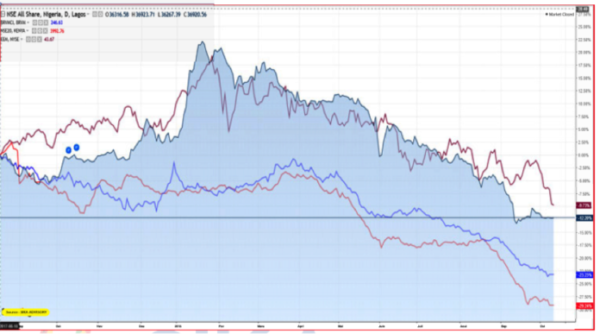By Daniel Aggre, SIKA ADVISORY Abidjan.
The downward trend observed since the 2nd quarter of 2018 continued in the 3rd quarter. During this quarter, the BRVM Composite index fell by almost 13%. This downward trend does not seem specific to our market. Indeed, this is a trend observed in the majority of the markets comprising the MSCI index of the EMERGING and FRONTIER countries of which we are part.
When we analyze African markets, (for example, image 1, on the cover), the Kenyan (red), Nigerian (blue), BRVM (dark blue) and the MSCI Emerging Market (red Bordeaux) markets us. The Nigerian stock market, as the picture shows, has fallen by almost 16% since July, that of Kenya has fallen by almost 15% and the MSCI-Emerging Market index by 5% (and 22% since the beginning of the year).
In sum, emerging markets did not perform well during the third quarter. We have thus listed the main hypotheses that could explain the downward channel in which the BRVM is sailing.
Probable causes of the fall of the market in the 3rd quarter:
The first cause that we could note is the loss of confidence of the BRVM investors. Indeed, in the face of such behavior, the probable and rational cause had to be linked to company fundamentals. Excluding ECOC (Ecobank Ivory Coast) and NSIA, which made their introduction in 2017, we record:
- A decrease of only 2.86% of dividends to 342.76 billion FCFA in 2017 against 352.87 billion FCFA in 2016.
- An increase of 66.20% of the net results to 599.889 billion FCFA in 2017 against 360.95 billion FCFA in 2016. This strong growth is due to ETIT which ended the year 2017 with 121.81 billion FCFA against -125.49 billion FCFA in 2016.
So, we can conclude that fundamentals can not be the real cause of this decline. In view of the downward trajectory of the market and to support our claims, the SIKA ADVISORY Research Desk has developed a sub-regional stock market confidence index to measure the perception of financial analysts and portfolio managers on the market outlook.
The perception of the actors surveyed has deteriorated sharply regarding the outlook at the end of 2018. The index of confidence of the actors surveyed came out (on an interval of 0 to 100) to 15.97 points on the month of September against 35.55 points previously. They are overall pessimistic about the ability of the BRVM Composite Index to end 2018 in positive territory.
The 2nd cause of decline: the rise in the interest rate in the United States
Rising interest rates in the United States and the strengthening of the dollar have changed investors’ perceptions of the EMERGING and FRONTIER markets. According to an article in the boursier.com, emerging countries seem to no longer attract US investors who now prefer their market.
As a result, a repatriation of flows to the US market occurred in the 3rd quarter. This could explain the 22% drop in the MSCI index observed since the beginning of this year.
3rd cause of decline: the SAF CACAO case.
With an estimated liability of CFAF 150 billion to the banks, the announcement of the liquidation of SAF CACAO was a blow for the market and more specifically for companies in the banking sector. In a market lacking confidence and characterized by a lack of communication, the perception of investors was guided by the many statements of the Ivorian government that did not reassure a possible solution for banks. Indeed, on Tuesday 25 September 2018, President Alassane Ouattara pointed out the responsibility of the banks and considered that the State of Côte d’Ivoire would not take any special measures for this case.
The market reacted to this whole thing by punishing heavily all banks. The banking index thus fell from 80.46 points to 70.1 points, a decrease of 13.40% during this quarter. It should be noted that this sector represents around 36% of the total capitalization of the BRVM.
4th cause of decline: A deleterious political climate in Ivory Coast
The deterioration of the political climate in Côte d’Ivoire seems to have accentuated the decline of the market. During the month of July, the PDCI announced to its political ally the RDR its intention to leave the RHDP (the ruling coalition). Since then, we are witnessing a certain tension in the Ivorian political landscape that is not likely to reassure investors at 2 years of presidential elections.





